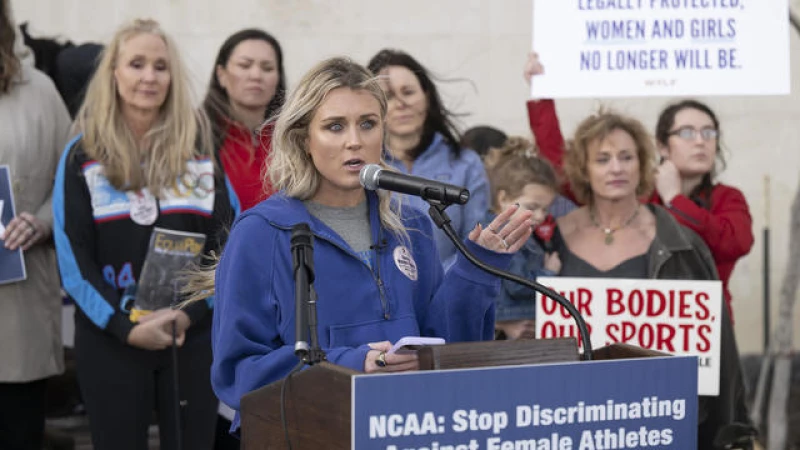Former Kentucky swimmer Riley Gaines was among more than a dozen college athletes who filed a lawsuit against the NCAA on Thursday, accusing it of violating their Title IX rights by allowing transgender woman Lia Thomas to compete at the national championships in 2022.
The lawsuit, filed in U.S. District Court in Atlanta, details the shock Gaines and other swimmers felt when they learned they would have to share a locker room with Thomas at the championships in Atlanta. It documents a number of races they swam in with Thomas, including the 200-yard final in which Thomas and Gaines tied for fifth but Thomas, not Gaines, was handed the fifth-place trophy.
Thomas swam for Pennsylvania. She competed for the men's team at Penn before her gender transition.
One of the plaintiffs, Tylor Mathieu from Florida, placed ninth in the preliminary heats of the 500 free, just missing out on a spot in the final that was eventually won by Thomas, the first openly transgender athlete to secure a Division I title in any sport. Thomas outperformed three Olympic medalists to claim the championship. Mathieu's absence from the final cost her the opportunity to earn first-team All-American honors in that event.
Additional plaintiffs in the lawsuit included athletes from volleyball and track.
The lawsuit was filed by the plaintiffs to uphold the promise of Title IX for future generations of women, which they believe is being denied by the NCAA and other college women's sports organizations.
"College sports serve as the primary platform for women's sports in America, and while the NCAA refrains from commenting on ongoing legal matters, the Association and its members remain committed to upholding Title IX, making substantial investments in women's sports, and ensuring fair competition in all NCAA championships," stated the NCAA in response to the lawsuit.
Critics argue that transgender athletes may possess an advantage over cisgender women in sports competitions. However, comprehensive research on elite athletics is still limited, particularly in determining whether a transgender female athlete at the high school level, for example, holds a significant advantage over her cisgender peers or teammates.
In 2022, the NCAA adjusted its policies on transgender athlete participation to align with the guidelines set by the U.S. Olympic and Paralympic Committee and other national sports governing bodies.
The third phase of the updated policy incorporates standards from national and international sports governing bodies into the NCAA regulations and is set to be enforced starting from the 2024-25 academic year.
In a recent legal action, the University of Georgia system has been named as a defendant due to its affiliation with Georgia Tech, the host of the 2022 championships. The lawsuit aims to prevent the NCAA from implementing its transgender eligibility regulations, which are alleged to disadvantage female athletes and breach Title IX, during future events in Georgia.
Despite the development, representatives from the Georgia schools have stated that they have not yet received the lawsuit and therefore declined to provide any comments on the matter.







